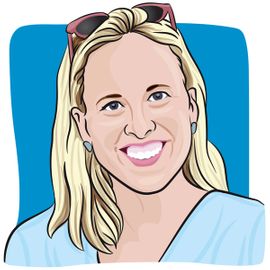- About Us
- Advertise / Support
- Editorial Board
- Contact Us
- CancerNetwork.com
- TargetedOnc.com
- OncLive.com
- OncNursingNews.com
- Terms & Conditions
- Privacy
- Do Not Sell My Information
- Washington My Health My Data
© 2025 MJH Life Sciences™ and CURE - Oncology & Cancer News for Patients & Caregivers. All rights reserved.
How Joe Biden’s Experience With Cancer Influenced My Journey

Erica Finamore is an editor and writer from New York City. After 26 months of caregiving, she lost her husband to glioblastoma, a terminal brain cancer, at age 30. She is a brain tumor research advocate and member of the Gray Nation Endurance Team through National Brain Tumor Society.
President-elect has a well known personal relationship with cancer as his son Beau Biden was diagnosed with glioblastoma and passed from this disease. This high-profile journey and story had an impact on my own journey with cancer.
Most people in the cancer community know about President-Elect Joe Biden and his son Beau Biden. Beau was diagnosed with glioblastoma and lived over two years with the disease, working through most of it as the Attorney General of the state of Delaware. Regardless of your views on politics, there’s no doubting that having anyone in a high office with a very personal connection to cancer is helpful—both for awareness and advancement.
When my husband Jon Marc got diagnosed at age 28, it was incredibly difficult to find other people near that age range to talk to about it. People didn’t want to alarm us, but they also didn’t want to give us hope when it wasn’t realistic. I wanted to get people’s real experiences and real stories, but what I kept getting were watered down experiences that remained mostly clinical rather than emotional. Glioblastoma also affects everyone so differently that I rarely relate with one person’s “journey” on a deeper level. The losses each person experiences are so different, and they come at such vastly different speeds.
In a time where I was looking for anyone with any kind of experience, I found “Promise Me Dad: A Year of Hope, Hardship, and Purpose,” Joe Biden’s book about his son’s illness, his decision not to run for President in 2016, and his time as Vice-president. I read it because a variety of people told me not to; that it would hit too close to home. I knew from that endorsement that it was exactly what I needed to read right then. Jon Marc was only four months into his diagnosis, and I knew parts of it would be hard to read because Beau inevitably didn’t survive this, but I’m a planner and I just wanted to see if I could get any idea of what I was in for.
I learned a lot about Beau’s particular tumor and his experience. Like Jon Marc, Beau had aphasia or “tip of the tongue” syndrome. You know what word you’re looking for, but you can’t get it out and it’s frustrating when this happens to people just occasionally, but when it’s all the time it’s a social nightmare. Beau also found himself going through options A, B, C and D in his treatment, and at the time, Jon and I had had a rough few month of letdowns and changes of treatment plans. There’s something about knowing that someone else out there who was also smart and driven and actually, from Wilmington, DE, that had gone through what we were going through.
There are a few quotes from the book that I highlighted at the time, and as I read them now, they strike me just as powerfully, albeit differently, but this one in particular seems to click more now than ever.
“When one of your loved ones goes out of your life, you think what he might have done with a few more years, and you wonder what you are going to do with the rest of yours. Then one day, because there is a world to be lived in, you find yourself part of it, trying to accomplish something—something he did not have time enough to do. And perhaps that is the reason for it all,” from Joe Sr., President-Elect Biden’s father.
When Jon passed this last April, I felt sad and cheated and angry, but then I also knew I had to channel that into gratitude somehow. Jon didn’t get more time, but I do—I live every day now knowing I have to make it count in some way. It’s a lot of pressure, but more often than not it pushes me to be a better version of myself.
It pushes me to act; to be kinder, to take joy in small things and to tell Jon’s story and work toward a cure for glioblastoma. Even in death, Jon drives me to be a better person—there’s something comforting about that.
For more news on cancer updates, research and education, don’t forget to subscribe to CURE®’s newsletters here.
 Download Issue : Heal Winter 2021
Download Issue : Heal Winter 2021Related Content:


